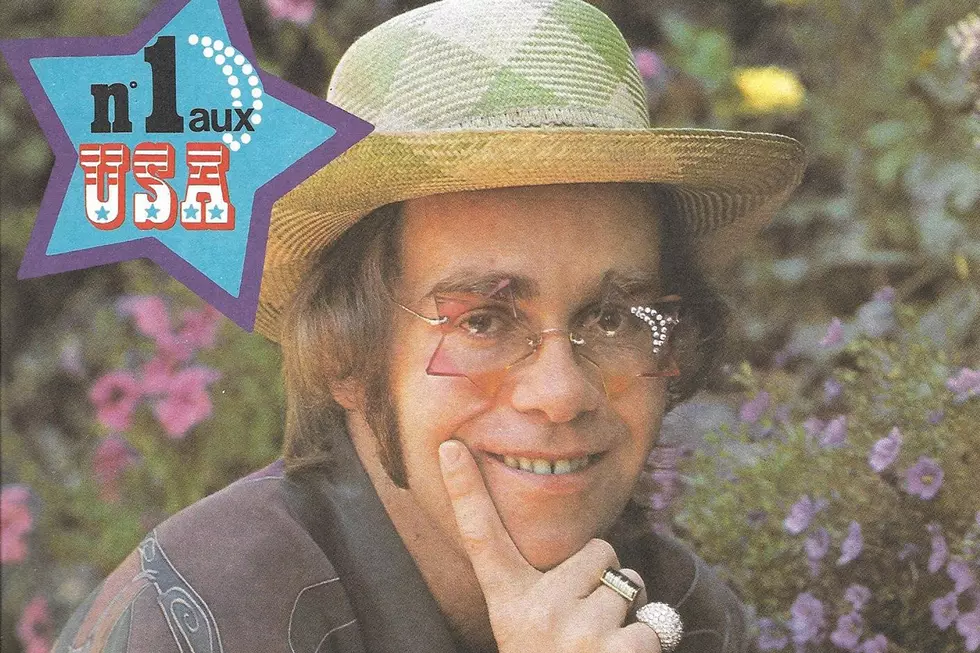
How an ‘Exhausted’ Elton John Still Hit No. 1 With ‘Island Girl’
By the time his "Island Girl" hit No. 1 in the U.S. on Nov. 1, 1975, Elton John was at his breaking point.
Almost exactly one year earlier, his duet with John Lennon, "Whatever Gets You Thru the Night," also topped the Billboard Hot 100. The autobiographical Captain Fantastic and the Brown Dirt Cowboy, released in the spring of 1975, became the first album to debut at No. 1 in the U.S. The following October he made history again when he released Rock of the Westies, another No. 1 debut.
"No one had ever done that before -- not Elvis [Presley], not the Beatles -- and now I'd done it twice, in the space of six months," John wrote in his 2019 autobiography, Me. "I was 28 years old and I was, for the moment, the biggest pop star in the world."
"Island Girl," a considerably uninspiring reggae tune about a Jamaican prostitute in New York City, was chosen as the lead single from Rock of the Westies. John reportedly thought "Dan Dare (Pilot of the Future)" had more commercial appeal, but was outvoted. A little more than a month after its release in late-September, "Island Girl" became John's fifth U.S. No. 1, and it stayed at the top for three weeks.
But beneath the glitz and glamour, John was beginning to feel the pressure of such intense stardom. Even before Rock of the Westies, the dynamic of his musical family had shifted significantly -- a reliable sign that things were not going well. In April 1975, just before the release of Captain Fantastic and the Brown Dirt Cowboy, John fired his longtime drummer Nigel Olsson and bassist Dee Murray, and replaced them with drummer Roger Pope, who had played on several previous Elton John records, and bassist Kenny Passarelli, who had played with Stephen Stills and co-founded Barnstorm with Joe Walsh.
John also knew his hot streak would, inevitably, have to come to an end at some point.
"It was a pinnacle, and I was smart enough to know that it couldn't last, at least not at that pitch," he wrote in Me. "Success on that level never does; it doesn't matter who you are, or how great you are, your records aren't going to enter the chart at Number One forever."
Disappointed with the trajectory his career had seemed to take, he secretly looked forward to the chaos quieting down.
"I knew someone or something else was going to come along. I was waiting for that moment to happen, and the thought of it didn't scare me at all," he added. "It was almost a relief when the second single from Rock of the Westies, 'Grow Some Funk of Your Own,' wasn't a huge hit. For one thing, I was exhausted: exhausted from touring, exhausting from giving interviews, exhausted by the ongoing catastrophe that was my personal life. And for another, I'd never really set out to have hit singles. I was an album artist, who made records like Tumbleweed Connection and Madman Across the Water, and I'd inadvertently become this huge singles machine, having smash after smash after smash, none of which had been intentionally written to be hit singles."
But before that could happen, John pushed on. As "Island Girl" was rising to the top, Tom Bradley, the mayor of Los Angeles, declared the last week of October as "Elton John Week," in celebration of John's upcoming shows at Dodger Stadium.
"We were having a great time," John is quoted as saying in Philip Norman's 2001 biography, Sir Elton: The Definitive Biography, "but something inside me was so revolted by the thought of constant touring that I just wanted to say 'I've had enough.'"
It happened a few days before the Dodger Stadium shows, when he attempted suicide in front of his friends and family at his Los Angeles home by taking a handful of Valium and throwing himself into his pool. After recovering, he hit the stage on Oct. 25 and 26, playing to sold-out crowds of over 100,000 people between the two nights. "Island Girl" was included on the setlist for both evenings. For John, the energy of the shows provided a much needed revitalization.
"That's the thing about playing live, for me at least," he wrote in his autobiography. "Even now, whatever turmoil I might be going through just gets pushed aside. Back then, when I was onstage I just felt different from when I was offstage. It was the only time I really felt in control of what I did."
Watch Elton John Perform "Island Girl"


